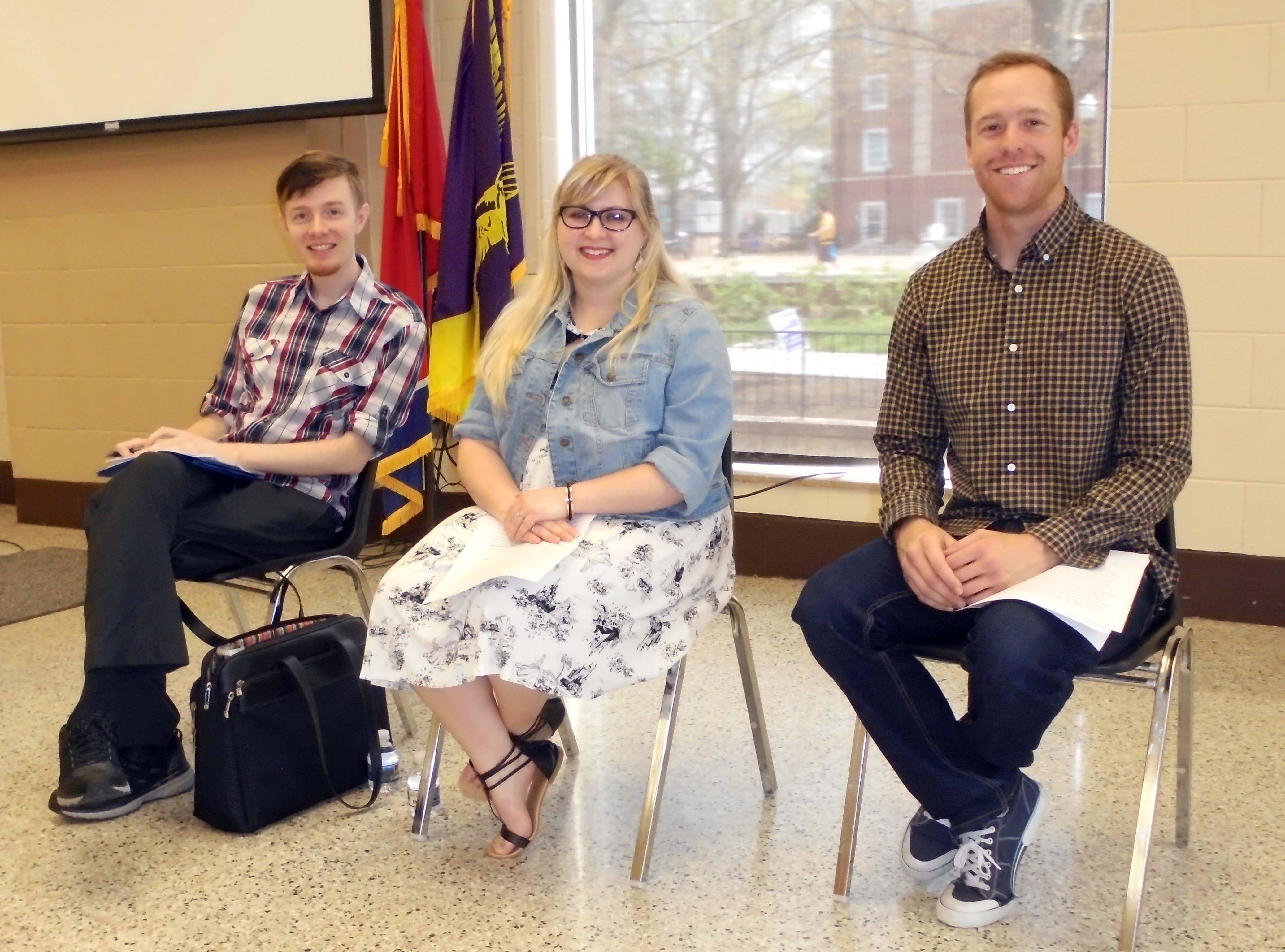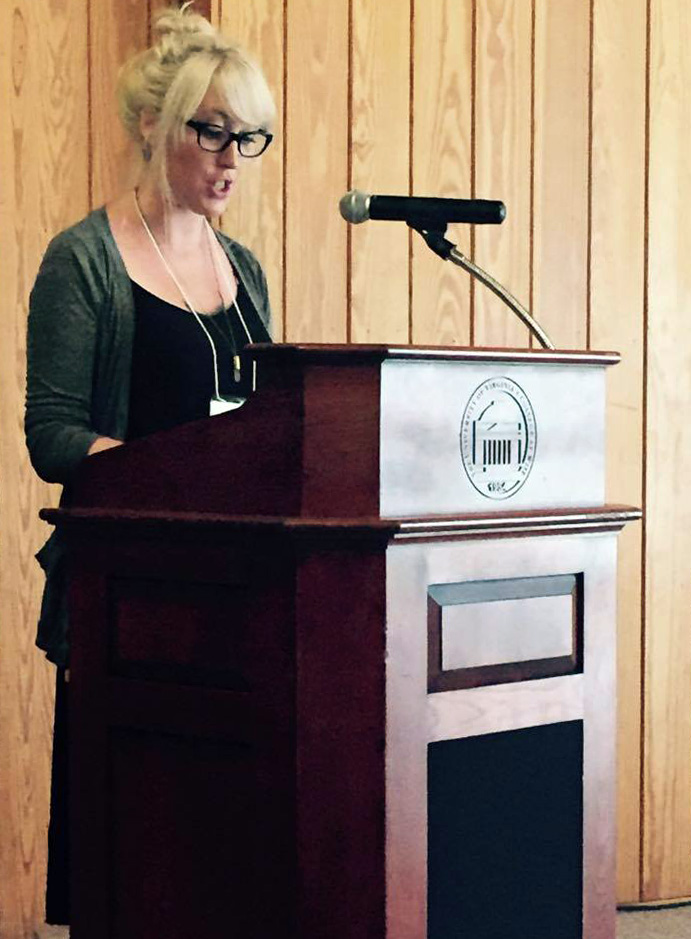Master of Arts

Students in Tennessee Tech's Master of Arts program may choose to extend their English studies after their undergraduate degree, pursue additional training related to a current or desired occupation, or increase their competitiveness for terminal degree programs such as the M.F.A. or Ph.D.
Our program offers flexibility for working students, with the option to take classes in a hybrid format, allowing for both in-person and remote participation. Students in our three tracks take core classes that specifically focus on gaining real-life, marketable skills and delivering tangible results for future jobs or continuing education.
We invite current Tennessee Tech undergraduate English Majors to consider our B.A./M.A. Fast Track Program in English.
To apply for admission, and for detailed application instructions, go to Graduate Admissions.
Why Pursue a Master's?
Tennessee Tech's M.A. in English degree appeals to students seeking a balanced and comprehensive education aligned with industry demands without giving up the freedom to specialize in the field within English that most interests them.
We offer three concentrations: Literature, Creative Writing, and Professional and Technical Communication.
Mission Statement: The Master of Arts degree program in the Department of English prepares graduates for success in any further graduate and professional education that might require superior analytical and communication skills, as well as for careers outside the academic world wherever superior analytical and communication skills and knowledge of literary and cultural traditions are essential. Our English M.A. also provides superb grounding for seeking a Ph.D. in English by increasing students' knowledge of literary history and improving their skills in writing, literary analysis, and research. Graduates can also become effective high-school or college-level teachers by improving their knowledge of writing pedagogy and theory.
Scholars and professionals who go on to earn their M.A. at Tennessee Tech gain knowledge and establish credibility in their field, and within some salary structures (such as teaching), they can earn higher pay.
Read on for more information about benefits of the M.A. in English, what exactly your studies will entail if you enroll in Tennessee Tech's program, and how to apply for (and fund) your graduate degree.
› The M.A. Experience
› Thesis or Portfolio?
› Financial Assistance
› How to Apply
› Contact Us
› FAQs
The M.A. Experience
 All graduate students in English take core courses based on developing practical skills
along with concentration-specific courses in their chosen area. These classes are:
All graduate students in English take core courses based on developing practical skills
along with concentration-specific courses in their chosen area. These classes are:
- Small. You'll form a stronger relationship with your peers and professors and engage in guided inquiry tailored to your individual needs.
- In-person or Hybrid. You can attend classes remotely, or teach on campus (with training) as a funded teaching assistant.
- Customizable. Check out our recent course offerings using the button below. If you don’t see a class you need, your advisors will work with you on planning a class or internship.
- Opportunistic. Whether you aim to get published, present at a conference, create an impactful project, acquire an internship, or meet your future employers, our faculty experts will help you plan and pursue specific and achievable goals.
Graduate courses are taught by advanced-degree faculty whose credentials have been approved by Tennessee Tech's College of Graduate Studies, listed at the bottom of this page. Graduate students are encouraged to consult faculty specializations before selecting their committee members.
Course Offerings | Faculty Specializations
Thesis or Portfolio?
Earning a graduate degree (no matter the field) requires a culminating project after your coursework is finished. With a master's degree this is often a thesis. Writing a thesis is guaranteed to build your subject area knowledge, your project management and research skills, and your sense of accomplishment—and it can be fun. Not all concentrations require a thesis, but if you complete one, its form and focus will be up to you in consultation with your committee.
If your concentration requires a portfolio or you choose to complete one, you'll put together and present a collection of projects developed in courses or through fieldwork or research, with the support and input of your committee. The resulting portfolio is designed to showcase your acquired knowledge and skills.
- Literature. Write a research-driven, multi-chapter thesis about a literary topic of your choice or create a portfolio of work to demonstrate your scholarship.
- Creative Writing. You must complete a thesis. However, it isn’t the standard research paper. You can write a novel, a short story or essay collection, a poetry manuscript, or other lengthy work.
- Professional and Technical Communication. Create a portfolio of work encompassing multiple projects to share with prospective employers.
Thesis Criteria | Thesis Timeline | Portfolio Criteria | Portfolio Timeline
Financial Assistance
You can apply to the College of Graduate Studies for scholarships to cover some of your costs.
Additionally, we encourage applicants to apply for a Graduate Teaching Assistantship, which covers graduate tuition and a yearly stipend ($10,400 paid over Fall and Spring
semesters). In addition to funding your degree, working as a GTA will help you acquire
marketable skills that transfer directly to a resume or curriculum vitae. Follow
the instructions in Graduate Admissions to apply.
How to Apply
All materials must be submitted by the deadlines below to be eligible for full consideration. Visit Graduate Admissions for detailed application instructions and to apply.
- January 10th. Deadline for Fall admission
- September 1st. Deadline for Spring admission
We strongly suggest applying early if you are wanting financial assistance, as slots are awarded on a competitive basis. Applications may be considered after these dates, but assistantships are limited.
Contact Us
The Director of Graduate Studies is happy to answer your questions and support the decision that is best for you, whether you are currently exploring your options or have already made the decision to apply to Tennessee Tech.
| Bounds, Paulina | Director of Graduate Studies | |
| Thomas, Steven | Department Chair |
Graduate Faculty: Brett Armes, Anthony D. Baker, Paulina Bounds, Kristen Deiter, Rachel Donegan, Monic Ductan, Jennifer Gray, Sharon K. Henry, Erin Hoover, Helen Hunt, Shirley D. Laird, Susan M. Moynihan, Linda J. Null, Ted Pelton, Kristin D. Pickering, Mari Ramler, Scott Stenson, and Brian J. Williams.

